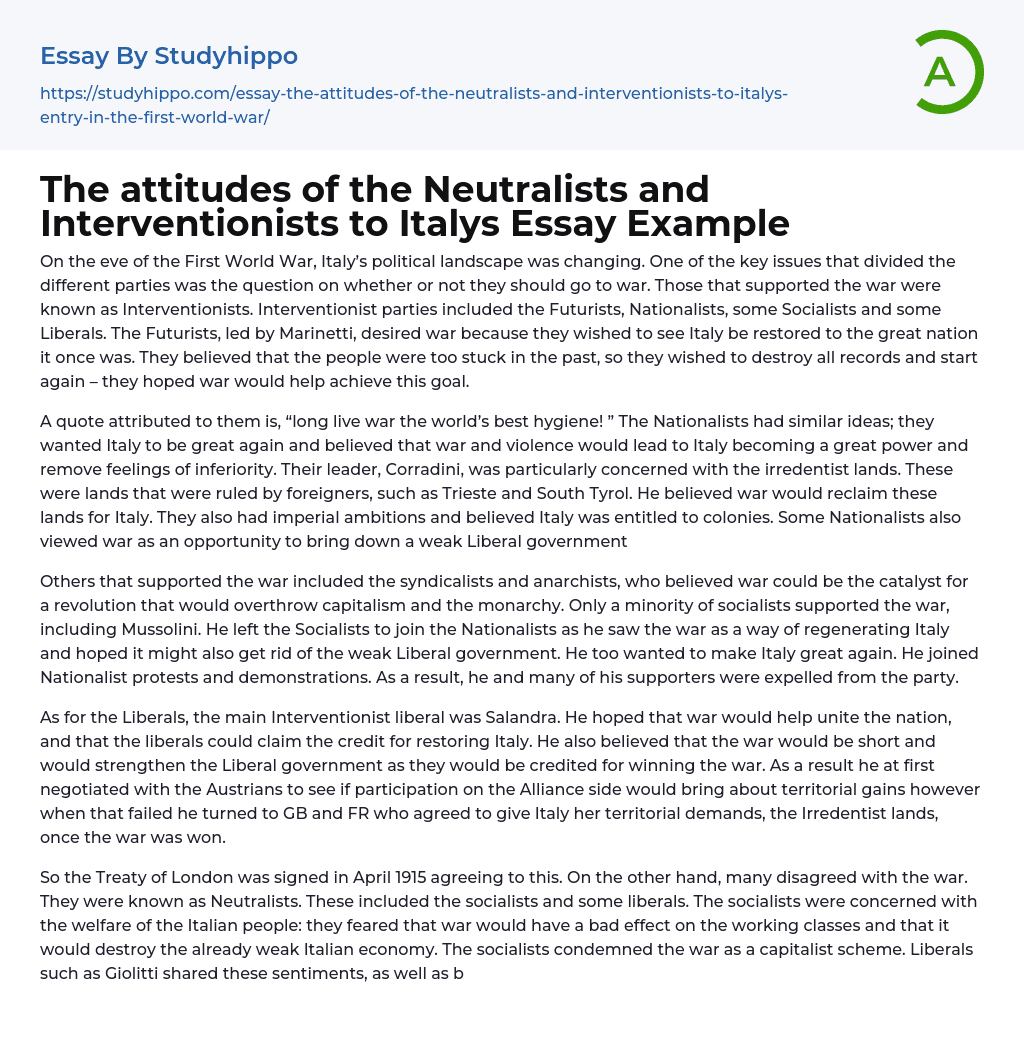

The attitudes of the Neutralists and Interventionists to Italys Essay Example
On the eve of the First World War, Italy’s political landscape was changing. One of the key issues that divided the different parties was the question on whether or not they should go to war. Those that supported the war were known as Interventionists. Interventionist parties included the Futurists, Nationalists, some Socialists and some Liberals. The Futurists, led by Marinetti, desired war because they wished to see Italy be restored to the great nation it once was. They believed that the people were too stuck in the past, so they wished to destroy all records and start again – they hoped war would help achieve this goal.
A quote attributed to them is, “long live war the world’s best hygiene! ” The Nationalists had similar ideas; they wanted Italy to be great again and believed that war and violence would l
...ead to Italy becoming a great power and remove feelings of inferiority. Their leader, Corradini, was particularly concerned with the irredentist lands. These were lands that were ruled by foreigners, such as Trieste and South Tyrol. He believed war would reclaim these lands for Italy. They also had imperial ambitions and believed Italy was entitled to colonies. Some Nationalists also viewed war as an opportunity to bring down a weak Liberal government
Others that supported the war included the syndicalists and anarchists, who believed war could be the catalyst for a revolution that would overthrow capitalism and the monarchy. Only a minority of socialists supported the war, including Mussolini. He left the Socialists to join the Nationalists as he saw the war as a way of regenerating Italy and hoped it might also get rid of th
weak Liberal government. He too wanted to make Italy great again. He joined Nationalist protests and demonstrations. As a result, he and many of his supporters were expelled from the party.
As for the Liberals, the main Interventionist liberal was Salandra. He hoped that war would help unite the nation, and that the liberals could claim the credit for restoring Italy. He also believed that the war would be short and would strengthen the Liberal government as they would be credited for winning the war. As a result he at first negotiated with the Austrians to see if participation on the Alliance side would bring about territorial gains however when that failed he turned to GB and FR who agreed to give Italy her territorial demands, the Irredentist lands, once the war was won.
So the Treaty of London was signed in April 1915 agreeing to this. On the other hand, many disagreed with the war. They were known as Neutralists. These included the socialists and some liberals. The socialists were concerned with the welfare of the Italian people: they feared that war would have a bad effect on the working classes and that it would destroy the already weak Italian economy. The socialists condemned the war as a capitalist scheme. Liberals such as Giolitti shared these sentiments, as well as being concerned about the state of the Italian army.
Many Liberals opposed the idea of entering the war. About 100, led by Giolitti, believed that Italy wasn’t ready for war and that war would be bad for Italian society and economy. The Catholic Church were unhappy about the idea of the war and fighting other Catholic countries
like Austria. They kept diplomatically quiet. The Italian public were also apathetic about the idea of war but supported the belief that participation might lead to territorial gains from the Austrian Empire.
- Berlin essays
- Pompeii essays
- Paris essays
- Athens essays
- Belgium essays
- England essays
- Germany essays
- Greece essays
- Ireland essays
- Italy essays
- London essays
- Russia essays
- Spain essays
- United Kingdom essays
- Great britain essays
- Rome essays
- British essays
- Birmingham essays
- World War I essays
- World War Ii essays
- Atomic Bomb essays
- American Civil War essays
- Attack essays
- Cold War essays
- Crimean War essays
- Emilio Aguinaldo essays
- Iraq War essays
- Korean War essays
- Nazism essays
- Nuclear Weapon essays
- Philippine Revolution essays
- Trench Warfare essays
- Vietnam War essays
- Western Front essays
- Diplomacy essays
- Emperor essays
- Rwanda essays
- Tribe essays
- Revolutionary War essays
- War of 1812 essays
- Mexican American War essays
- Hitler essays
- The Spanish American War essays
- League Of Nations essays
- Battle Of The Somme essays
- Treaty Of Versailles essays
- Fascism essays
- D-day essays
- Atomic Physics essays
- Atomic Bombings Of Hiroshima And Nagasaki essays



